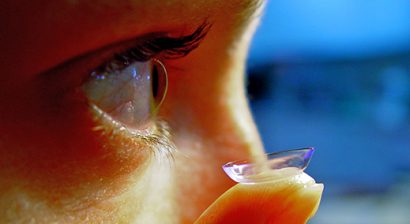Can You Wear Contact Lenses after LASIK?
Written by Dr. David Evans Last modified on April 22, 2019
A relatively common question that we receive through Better Vision Guide is “can I wear contact lenses after getting LASIK?” On the surface, you might think this to be a strange question given that the intent of LASIK is generally to rid dependence on eyeglasses or contact lenses. However, there are occasions where contact lenses may be appropriate after LASIK.
The bottom line is that YES, you can wear contact lenses after LASIK if you choose to. And there are a few occasions where you might chose to do so. I thought I’d dedicate this post to discussing these occasions.

Presbyopia
Historically, the average age of a LASIK patient is around 40 years old. However, as the technologies and treatments continue to improve, greater numbers of younger patients are opting for LASIK vision correction. This is important when you consider that presbyopia — a condition marked by near vision loss — typically begins to develop around age 40. Younger LASIK patients are unlikely to consider presbyopia when opting for treatment, but it’s a condition that will inevitably cause vision to deteriorate over time. Regardless of how much your vision improves after surgery, your eyes are still at the mercy of father time and you will eventually experience age-related loss of near vision.
LASIK patients who develop presbyopia may seek near vision correction in the form of contact lenses or reading glasses.
Other Changes in Vision
For some patients, LASIK may not be a permanent vision correction procedure. And changes in vision are not reserved for presbyopia.
Younger LASIK patients may not begin to develop presbyopia for 20 – 30 years after their procedure. However, during this time it is possible to experience regular shifts in vision as the eyes age. In such cases (especially mild changes), patients may simply opt for contact lenses or glasses to improve vision, rather than considering a secondary corrective procedure.
Suboptimal LASIK Correction
LASIK is one of the safest and most successful procedures performed today. That said, not every patient will experience optimal correction. Complications or suboptimal correction can often be fixed with additional treatment (oftentimes at no additional cost), however not all patients elect to undergo additional LASIK procedures.
Given the choice of additional LASIK treatment or an alternative corrective option like contact lenses, some patients opt for the latter. It’s important to note that patients are advised to wait several months after LASIK before getting contact lenses.
Colored Contact Lenses
After Twilight became a big hit, colored contact lenses saw a surge in popularity for Halloween and other costume-related occasions. If you’ve had LASIK and are interested in colored contacts, you should be able to enjoy them without problem. It is advisable to speak with your eye doctor before using non-prescription colored contacts.
However…
For contact lenses that correct vision after LASIK, there can be challenges associated with the fitting process; chief among which is the type of lens used. Most LASIK patients are unable to wear soft contact lenses after surgery because their pliability prevents them from maintaining the shape required to correct post-LASIK vision problems. For this reason, gas permeable (GP) contact lenses are the preferred option for post-LASIK patients.
GP lenses are rigid, meaning they hold their shape rather than conforming to the surface of the cornea like soft lenses. Hybrid lenses (combination of GP and soft) may also be an option for certain patients. For these hybrid lenses, there is a rigid center optical surface and then a skirt of soft contact lens material. These may offer a more comfortable fit than the rigid GP variant; especially for patients with a history of wearing soft contact lenses.
On a related note, GP contact lenses can help treat a condition called corneal ectasia, which on rare occasions can be a complication of LASIK, a procedure that changes the shape of the cornea to improve vision. It is possible for the reshaping to weaken the cornea, which can cause it to protrude outwards, distorting vision. The rigidity of GP lenses can help the weakened cornea maintain its shape.
If you’ve had LASIK surgery and are beginning to experience changes in your vision, speak with your eye doctor about your contact lens options.




